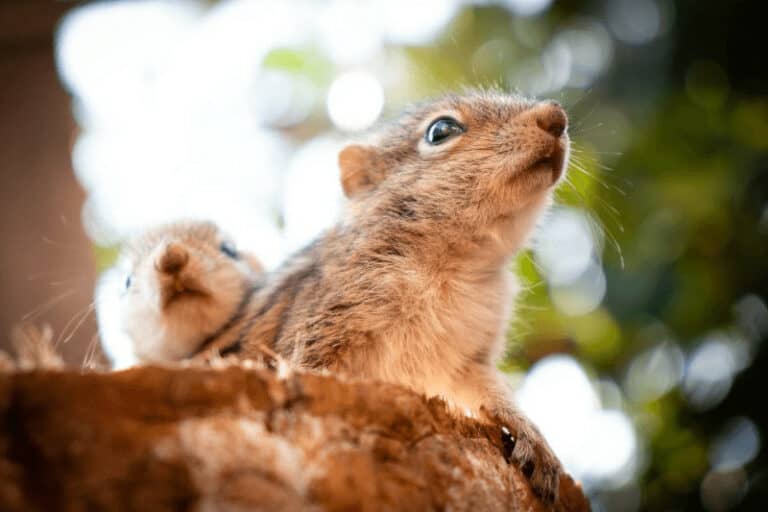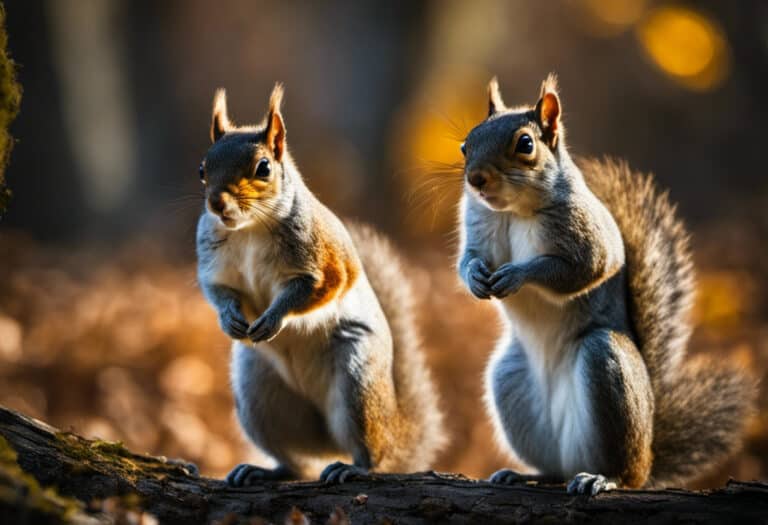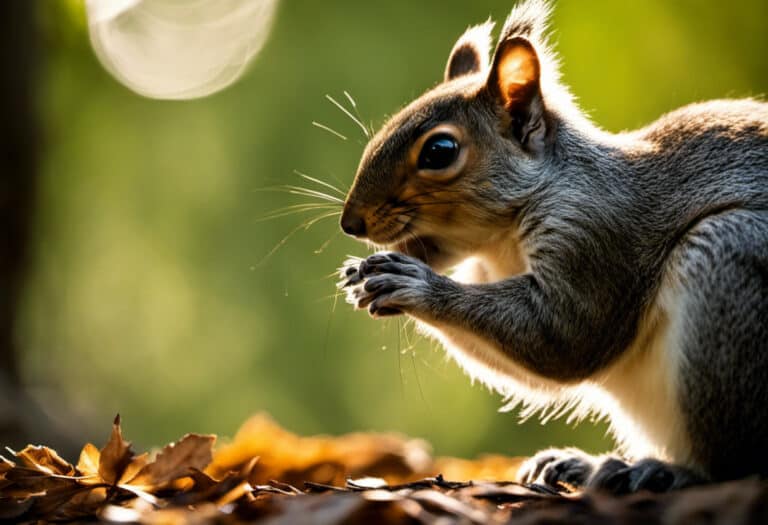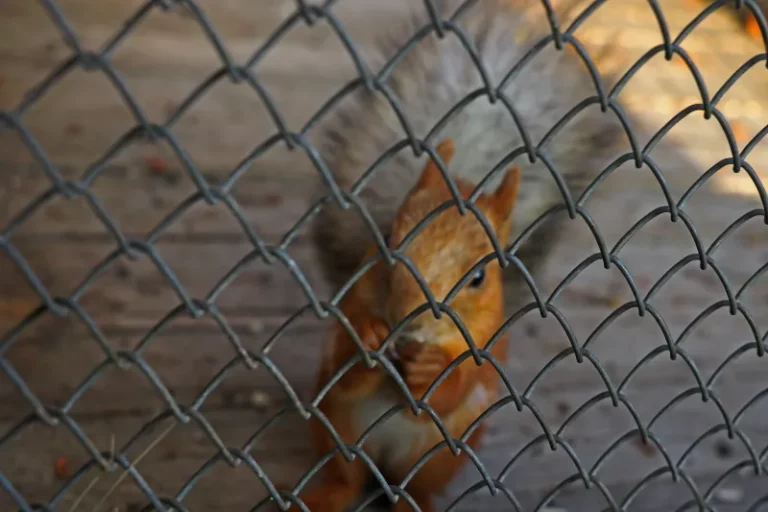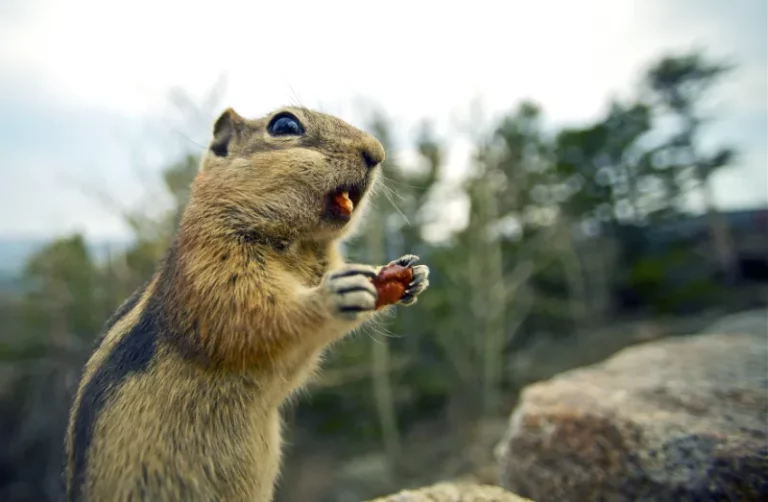What Can Squirrels Not Chew Through?
Have you ever wondered what squirrels cannot chew through? These furry creatures are known for their sharp teeth and ability to chew through almost anything, including wood, plastic, and wires. However, there are some materials that squirrels find difficult to gnaw through, and knowing what they are can help you protect your home and property.
Understanding squirrel chewing habits is the key to preventing damage to your home and property. Squirrels have a natural instinct to chew, which helps them keep their teeth sharp and healthy. They also chew to gain access to food and shelter. Unfortunately, this behavior can cause significant damage to your home and property if left unchecked.
Common materials squirrels chew through include wood, vinyl, plastic, and aluminum. However, there are some materials that squirrels cannot chew through, such as steel mesh and regular mouse traps. They also find it difficult to chew through hard metals like galvanized steel and stainless steel. By using these materials to squirrel-proof your home and property, you can prevent damage and keep these critters at bay.
Key Takeaways
- Understanding squirrel chewing habits is essential for preventing damage to your home and property.
- Squirrels can chew through many materials, including wood, vinyl, and plastic.
- However, they find it difficult to chew through steel mesh, regular mouse traps, and hard metals like galvanized steel and stainless steel.
Understanding Squirrel Chewing Habits
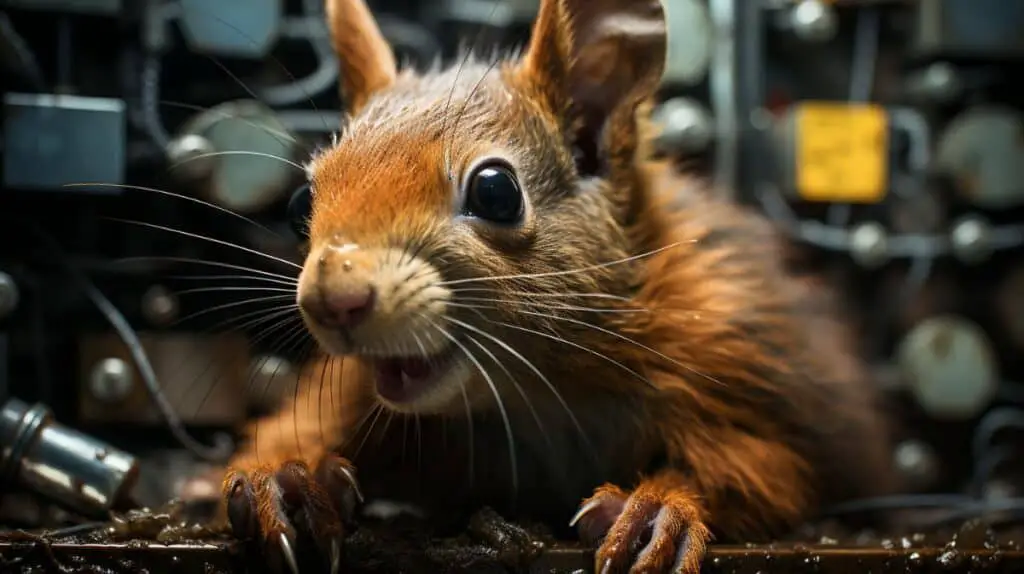
Squirrels are known for their gnawing and chewing habits, which can cause damage to various materials. They have four incisors, two on the top and two on the bottom, that continue to grow throughout their lives. To prevent their teeth from overgrowing, squirrels must constantly gnaw on objects to wear them down.
Squirrels have a varied diet that includes nuts, seeds, fruits, and vegetables. They use their sharp teeth to crack open nuts and chew through tough outer shells. However, they are not able to chew through certain materials that are too hard or strong for their teeth.
When it comes to materials that squirrels cannot chew through, metal and wire mesh are good options. Bird feeders and garden fencing made of metal or wire mesh are less likely to be damaged by squirrels. Galvanized steel or PVC pipes can also be used to protect wires and cables from squirrel damage, especially in outdoor spaces or attics where squirrels may be able to access them.
It is important to note that while squirrels cannot chew through certain materials, they are still able to cause damage by gnawing on them. For example, they may chew on wood or plastic to create holes for their nests or to gain access to food sources.
Overall, understanding squirrel chewing habits can help you protect your property from damage. By using materials that squirrels cannot chew through, you can prevent them from causing costly repairs.
Related Posts:
- 4 Simple Steps to Catch Ground Squirrels Quickly and Safely
- How to Capture a Squirrel
- The Best Way to Catch Squirrels: Proven Techniques
- How to Catch a Squirrel Without a Trap
- How to Trap a Red Squirrel
Common Materials Squirrels Chew Through
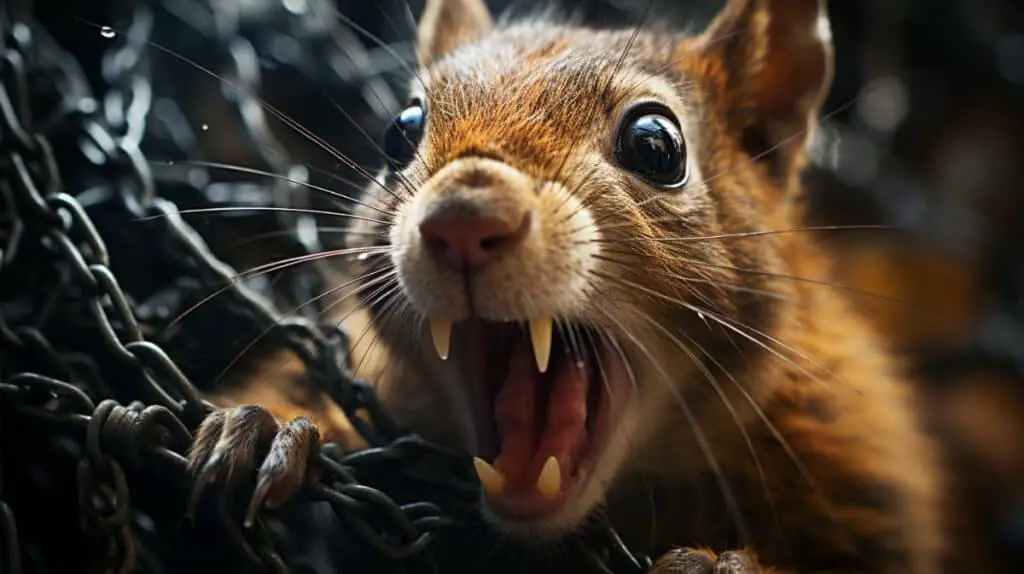
Squirrels are known to chew through a variety of materials, causing damage to homes, cars, and property. Here are some common materials that squirrels can easily chew through:
Wood
Squirrels have strong teeth and jaws that allow them to chew through wood. They often target wooden structures such as eaves, soffits, and fascia boards. They can also chew through wooden siding and trim, causing damage to your home.
Plastic
Plastic is another material that squirrels can easily chew through. They often target plastic garbage cans, bird feeders, and other plastic objects in your yard.
Roof
Squirrels can also chew through the roof of your home, causing damage to shingles, vents, and other roofing materials. They often target areas where there are holes or weak spots in the roof.
Wires
Squirrels are notorious for chewing through wires, causing damage to electrical systems and appliances. They often target wires in attics and crawl spaces, where they can easily access them.
Holes
Squirrels can easily chew through holes in your home, creating entry points for themselves and other pests. They often target areas around vents, pipes, and other openings in your home.
It’s important to take steps to prevent squirrels from chewing through these materials and causing damage to your home. This can include sealing up holes and entry points, trimming back tree branches, and using wire mesh or other materials to protect vulnerable areas.
Related Posts:
- 9 Effective Methods To Keep Squirrels Away From Your Car
- How to find out where Squirrels are getting in: Top 10 Entry Points
- 8 Signs Your House is Being Infested with Squirrels
- How to Get a Squirrel Out of your Wall? Quick and Easy Method
- Can Squirrel Chew Through Wall?
Impact on Home and Property
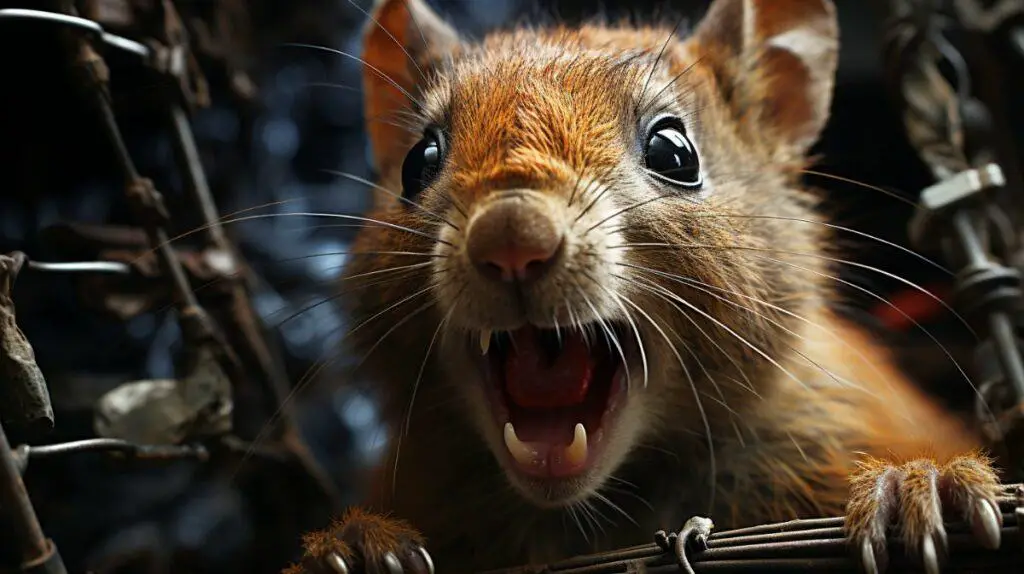
Squirrels can cause significant damage to your home and property if left unchecked. They can chew through various materials, including wood, plastic, and even lead, to gain access to your attic or other areas of your home. Once inside, they can cause further damage by chewing on wires, insulation, and other materials.
If squirrels are left to nest in your attic, they can create a mess with their droppings and urine. This can lead to unpleasant odors and potential health hazards for you and your family. Moreover, squirrels can also damage your yard and garden by digging holes and chewing on plants and vegetables.
To prevent squirrels from causing damage to your home and property, it is essential to take preventative measures. These can include using metal or wire mesh to protect bird feeders and garden fencing, using galvanized steel or PVC pipes to protect wires and cables, and sealing any potential entry points into your home.
If you suspect that squirrels have already taken up residence in your home or property, it is crucial to take action immediately. You can use humane traps or call in a professional wildlife removal service to safely and effectively remove the squirrels from your home.
Related Posts:
- How to Get Rid of Squirrels in the Roof
- What Damage Can Squirrels Do in the Attic
- How to Get Squirrels Out of Your House
- How to Get Rid of Red Squirrels in Garage
- How to Get Squirrels Out of the Attic: 6 Effective Methods
Squirrels and Metal Interaction
Squirrels have strong and sharp teeth that allow them to chew through many materials, including wood, plastic, and wires. However, when it comes to metal, squirrels have varying levels of success.
Soft metals like aluminum and copper are no match for squirrels’ teeth. They can easily chew through these materials, especially when they are looking for food, protection, or warmth. If you have aluminum siding or vents on your house, squirrels may be able to chew through them.
On the other hand, hard metals like galvanized steel and stainless steel are much more difficult for squirrels to chew through. These materials are often used to protect wires and cables from squirrel damage, particularly in outdoor spaces or attics where squirrels may be able to access them.
If you want to protect your property from squirrel damage, it’s best to use hard metals like galvanized steel or stainless steel. You can also use wire mesh made from these materials to cover openings or protect vulnerable areas.
In summary, squirrels can easily chew through soft metals like aluminum and copper, but they struggle to chew through hard metals like galvanized steel and stainless steel. If you want to protect your property from squirrel damage, it’s best to use hard metals and wire mesh made from these materials.
Squirrel-Proofing Techniques
Squirrels are notorious for their ability to chew through almost anything, including wood, vinyl, plastic, and aluminum. However, there are some materials that squirrels cannot chew through, such as steel mesh and galvanized steel. Here are some squirrel-proofing techniques to keep these pesky critters away from your property:
Mesh and Fencing
One of the most effective ways to squirrel-proof your property is to install steel mesh or fencing around vulnerable areas. Steel mesh is a sturdy material that is difficult for squirrels to chew through. Installing steel mesh over vents, chimneys, and other openings can help keep squirrels from entering your home. Fencing can also be used to keep squirrels out of gardens and other outdoor areas.
Squirrel Repellent
Squirrel repellent is another effective way to keep squirrels away from your property. There are several types of squirrel repellents available, including ultrasonic and electronic repellents. These devices emit high-frequency sound waves that are unpleasant to squirrels and can deter them from entering your property.
Squirrel-Proof Feeders
If you enjoy feeding birds, you may be frustrated by squirrels raiding your bird feeders. Squirrel-proof feeders are designed to keep squirrels away from birdseed. These feeders are typically made of metal and have a weight-activated mechanism that closes the feeding ports when a squirrel tries to access the seed.
Remember, it’s important to use squirrel-proofing techniques that are safe for both the squirrels and your property. Avoid using harmful chemicals or traps that could harm the squirrels.
Related Posts:
- Do Ultrasonic Squirrel Repellents Work? Find Out Here!
- How to Keep Squirrels Out of Flower Pots
- Do Electronic Squirrel Repellents Work?
- How to Keep Squirrels Out of Chicken Feed
- How to Keep Squirrels Away From Pumpkins
Squirrels and Outdoor Furniture
Squirrels can be a nuisance when it comes to outdoor furniture. They love to chew on things, and that includes your favorite patio furniture. However, there are some materials that squirrels can’t chew through. Here are some options to consider:
Vinyl Furniture
Vinyl furniture is a great option for outdoor spaces because it is weather-resistant and easy to clean. It is also squirrel-resistant because squirrels cannot chew through it. If you are looking for a low-maintenance and durable option, vinyl furniture might be the way to go.
Glass Furniture
Glass furniture is another option that squirrels cannot chew through. While it may not be the most practical option for outdoor spaces, it can add a modern and sophisticated touch to your patio or deck. Keep in mind that glass can be fragile and may not be the best option if you have children or pets.
Concrete Furniture
Concrete furniture is a sturdy and durable option that squirrels cannot chew through. It can also add an industrial and modern look to your outdoor space. Keep in mind that concrete furniture can be heavy and difficult to move around, so it may not be the best option if you like to rearrange your outdoor space frequently.
Other Options
If you prefer wooden furniture, there are some options to make it squirrel-resistant. Applying a squirrel repellent spray or coating the furniture with a spicy or bitter solution can deter squirrels from chewing on it. Alternatively, you can cover the furniture with a protective cover when not in use to prevent squirrels from accessing it.
Overall, while squirrels can be a nuisance when it comes to outdoor furniture, there are options available that they cannot chew through. Consider the materials listed above to find the best option for your outdoor space.
Natural and Humane Repellents
If you want to keep squirrels away from your property, there are a few natural and humane repellents that you can use. These repellents are effective and safe for the squirrels and the environment. Here are some of the best options:
Garlic
Garlic is a natural squirrel repellent that can be used in several ways. You can sprinkle crushed garlic around your garden or place garlic cloves in the soil near your plants. You can also make a garlic spray by boiling minced garlic in water and then spraying the mixture on your plants. Squirrels do not like the smell of garlic, so they will stay away from the area.
Cayenne Pepper
Cayenne pepper is another natural squirrel repellent that can be used in various ways. You can sprinkle cayenne pepper powder around your garden or mix it with water to make a spray. Squirrels do not like the taste or smell of cayenne pepper, so they will avoid the area.
Natural Repellents
There are several natural repellents that you can use to keep squirrels away from your property. These include peppermint oil, vinegar, and mothballs. You can place these repellents around your garden or in areas where squirrels are known to frequent. These natural repellents are safe and effective, and they will not harm the squirrels or the environment.
Capsaicin
Capsaicin is a natural compound found in chili peppers, and it is a potent squirrel repellent. You can mix capsaicin powder with water to make a spray, or you can sprinkle the powder around your garden. Squirrels do not like the taste or smell of capsaicin, so they will stay away from the area.
Related Posts:
- Best Squirrel Repellents in 2023 that Actually Works
- Do Coffee Grounds Keep Squirrels Away?
- Best Ultrasonic Squirrel Repeller: Top 9 Devices
Squirrels and Bird Feeders
If you’re a bird lover, you know how much joy bird feeders bring to your yard. Unfortunately, squirrels love bird feeders too, and they can quickly become a nuisance. Squirrels are notorious for their ability to chew through almost anything, but there are some materials they can’t gnaw through. Here are some tips to help you squirrel-proof your bird feeder:
Choose the Right Bird Feeder
When it comes to squirrel-proof bird feeders, there are several options available. Tube feeders, for example, are difficult for squirrels to climb because they are long and narrow. You can also choose feeders that are made of metal or have metal components, as squirrels have a harder time chewing through metal than plastic or wood.
Use a Baffle
If you already have a bird feeder that squirrels are getting into, you can install a baffle to keep them out. A baffle is a cone-shaped device that is placed above or below the feeder to prevent squirrels from climbing up the pole or tree branch. Make sure the baffle is positioned at least five feet off the ground and is big enough to cover the entire feeder.
Adjust the Height and Distance
Squirrels are excellent jumpers, so if your feeder is too close to a tree or other object, they can easily jump onto it. Make sure your feeder is at least ten feet away from any trees or structures. You can also adjust the height of the feeder to make it more difficult for squirrels to reach. A good rule of thumb is to hang the feeder at least five feet off the ground.
Choose the Right Birdseed
Believe it or not, the type of birdseed you use can also make a difference. Squirrels love sunflower seeds, so if you’re having trouble with them getting into your feeder, consider using a seed mix that doesn’t contain sunflower seeds. Safflower seeds, for example, are a good alternative that birds love but squirrels don’t.
In conclusion, squirrels can be a pesky problem when it comes to bird feeders, but there are ways to keep them at bay. By choosing the right feeder, using a baffle, adjusting the height and distance, and selecting the right birdseed, you can enjoy watching birds without the interference of squirrels.
Professional Solutions and Repairs
If you have tried DIY solutions and still have a squirrel problem, it’s time to call in the professionals. Pest control companies have the tools and expertise to safely remove squirrels from your property and prevent them from returning. They can also repair any damage caused by the squirrels.
Professional removal techniques include live trapping and relocation. This is a humane way to remove squirrels from your property without causing harm to the animals. Pest control companies can also use exclusion techniques to prevent squirrels from entering your home or attic. They will seal any entry points and install physical barriers to keep squirrels out.
In addition to removal, pest control companies can also repair any damage caused by squirrels. This includes repairing chewed wires, insulation, and damaged wood. They can also clean up any mess left behind by the squirrels, such as droppings and nesting materials.
Physical barriers are another effective way to prevent squirrels from entering your home. These include mesh screens, chimney caps, and vent covers. Pest control companies can install these barriers to prevent squirrels from entering your home through these openings.
Overall, if you have a persistent squirrel problem, it’s best to leave it to the professionals. They have the knowledge and expertise to safely remove squirrels from your property and prevent them from returning. They can also repair any damage caused by the squirrels and install physical barriers to keep them out.
Frequently Asked Questions
What materials are effective in preventing squirrels from chewing through them?
Squirrels are notorious chewers and can easily gnaw through materials such as wood, vinyl, and plastic. However, there are some materials that they cannot chew through, including metal, glass, and concrete. Sheet aluminum and copper are soft metals that squirrels can chew through, but harder metals such as steel and iron can be effective barriers. Additionally, wire mesh made from steel or copper is an effective way to keep squirrels from chewing through materials such as screen doors and windows.
What are some common signs of squirrel damage?
Squirrel damage can be identified by the presence of gnaw marks on wood, plastic, and other materials. Squirrels also leave behind piles of chewed-up material, such as wood chips and insulation. Other signs of squirrel damage include holes in roofs and walls, as well as damaged electrical wiring and plumbing.
How can I protect my home from squirrel damage?
There are several ways to protect your home from squirrel damage. First, make sure that all exterior openings, such as vents and chimneys, are covered with wire mesh. Trim back trees and bushes that are close to your home, as squirrels can use them to gain access to your roof. Additionally, make sure that any food sources, such as bird feeders, are kept away from your home to discourage squirrels from coming near.
What are some humane ways to deter squirrels from chewing on property?
There are several humane ways to deter squirrels from chewing on property. One effective method is to use repellents made from natural ingredients such as peppermint oil or hot pepper. These can be sprayed on surfaces that squirrels are likely to chew on. Another method is to use ultrasonic devices that emit high-pitched sounds that are unpleasant to squirrels.
Are there any natural deterrents that can be used to prevent squirrel damage?
Yes, there are several natural deterrents that can be used to prevent squirrel damage. One effective method is to plant certain types of plants that squirrels do not like, such as daffodils, alliums, and hyacinths. Additionally, placing predator urine around your property can deter squirrels from coming near.
What are some effective ways to repair squirrel damage to property?
Repairing squirrel damage to property will depend on the extent of the damage. For minor damage, such as gnaw marks on wood, sanding and refinishing the affected area may be sufficient. For more extensive damage, such as holes in walls or roofs, it may be necessary to hire a professional to make repairs. It is important to address squirrel damage promptly to prevent further damage from occurring.

